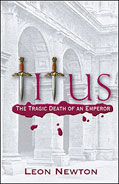 |
The Tragic Death of an Emperor by Leon Newton Outskirts Press
book review by Peter M. Fitzpatrick
"Your jails are filled with paupers, not criminals, and the gutters are filled with the heads of those who would dare to question the system. -VERITAS"
In an era when American soldiers have given their lives so that Iraqi people can exercise the democratic vote, when questions about Afghani presidential voting fraud get international attention, plays like this one have a special resonance. They do so by reminding us that these ideas and values have been with us for a very, very long time. Set in the reign of a fictional Roman emperor in the first century of the common era, Titus is the story of the fault lines and weakness that ran through the fabric of Roman society after it threw off republican forms of governance and law for monarchical and autocratic ones. Through economy of setting and starkly rendered characters, themes and issues of timeless power begin to emerge into the foreground of the story. Simple sounding ideas like democracy and truth, trust, mercy, justice, and the state find embodiment and representation in this short, two-act drama.
It is not an accident that this first century story of Roman political intrigue and double-dealing should have a mirroring effect for us today. Our very own concepts of checks and balances, separation of powers, term limits, and the power of veto are ultimately derived from the ancient Roman constitution. They had these ideas too. In fact, when we witness such things as pro-democracy protesters being clubbed and killed in the streets of Iran, we see elements of this play being enacted on the stage of life. They are powerful and very much living ideas. The author has done well to render them somewhat larger than life and almost archetypically. Issues such as truth and justice may seem abstract and airy. They are not to those who do not have them. That is perhaps what this play is mostly about. And in a time when torture, terror, and freedom operations are on the tips of all our tongues, it is wonderful that he has done so.
